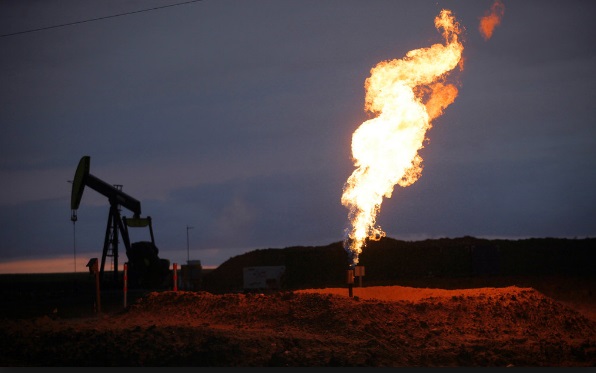Thirty metre high flames burn day and night in the village of Ebedei, in the Niger Delta, Nigeria. The heat from these fires is not soft or warm, it is prickly. The constant noise makes wild animals flee, and people must shout to be heard. Fields of crops, once green, turned yellow or stopped growing. The village no longer has darkness or the respite of cool at night. The air is contaminated with gas and harmful particles.
“You can’t believe it when I got close to the flare site, I felt first hand the heat, and it was like my skin was being pierced with some kind of needles or tips of broomsticks,” said Okonta Emeka, a Nigerian reporter who we collaborated with on this investigation.
Millions of people live within five kilometres of a gas flare in the Niger Delta, the oil-rich region in southern Nigeria. Below the flames, they’re extracting oil. With the oil comes unwanted gas, which is burnt off in a process called gas flaring.
Benjamin Nwaiku lives beside a constant flame. In 2001, he moved back to Ebedei where he grew up, retiring from his job to become a farmer and raise his seven children.
But in 2009, a flow station was erected right near his house to extract oil. He immediately became concerned about the possible effects on his health and his children’s’:
“We are living under the shade of hazard because of this flaring,” Mr Nwaiku said.
The flaring affected his income. He noticed his corn crops growing strangely, shooting up, as he described it, “like an electric pole, without any fruit”. The rise in soil temperature caused him and others a loss of crop yield.
“You plant and before you know it everything is dead,” he explained.
“It is a disaster.”
The noise and light of the flare bothered him too.
“If you are not sleeping with the noise and the heat you can’t sleep again,” said Mr Nwaiku, adding that he missed experiencing “total darkness,” and that his village hadn’t seen it since the flaring began.
During the rainy season, the rainwater was visibly black.
“It is not consumable,” Mr Nwaiku said, inspecting the sample of water his neighbour collected, “no need for a microscope.”
He said some in his community “risk their lives to drink the rainwater. They know the hazard they see.” “We can’t even use it to bath because it is very, very poisonous to the eye. Almost the whole of this community is having eye problems,” said Mr Nwaiku.
The rainwater, he said, corroded his zinc roof. Holes appeared and rotted the wood inside.
Flaring on the rise
Gas flaring was officially banned in 1984 but the government has repeatedly failed to meet promises to end the practice.









